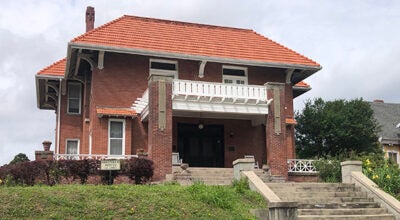FROM THE VAULT: Margaret Sue Moore, serving her country
Published 8:00 am Saturday, April 1, 2023
By the Late Gordon Cotton | Originally published in The Vicksburg Post on April 7, 2013
When Margaret Sue Moore told her mother in the fall of 1943 that she was going to join the Women’s Army Corps, Mrs. Moore told her, “You are not!”
She could have saved her breath. Margaret was living in Birmingham, and a few weeks later she sent her mother a copy of an Alabama newspaper that had a photo of girls who had joined the WACs — and Margaret was among them.
She served two years in World War II from 1943 until 1945 when the war ended. She received her basic training at Fort Oglethorpe, Ga., and was stationed at Merced, Calif., before going overseas and serving in the Philippines and New Guinea.
Several years ago, she gave her dress uniform and other military items to the Old Court House Museum-Eva W. Davis Memorial, and upon her death left objects from her years as a WAC to the museum. All are in a display commemorating women’s service in World War II.
Margaret was born in Vicksburg, the oldest daughter of Mr. and Mrs. William B. Moore. She graduated from Carr Central in 1939 and then from All Saints, which had a junior college program.
Her sister, Dot Dorman, remembers her as appearing to be self-assured, “but she was really bashful. Nobody would believe that she wouldn’t say boo to a goose.” Dot also joked that Margaret was “stubborn and opinionated — and, of course, I’m not!”
After the war, Margaret continued her education when she and Dot attended MSCW. She had planned to major in physical education but changed to history.
After graduation, she taught American and world history at Wingfield High School in Jackson until her retirement.
At Wingfield, she was featured in an article in the school newspaper written by one of the students, Lynda Land, who pointed out that in the study of World War II, “Miss Moore excels in behind-the-scenes knowledge” of that time in history.
As one who had always loved sports, she told of learning to ice skate while in California, and she attempted laugh snow skiing, something she said was difficult, but fun tying, though she added, “If you fall down, that is it.”
She sailed for Hollandia, New Guinea, on board the USS Monterey in late 1944 and was attached to the Far East Air Force under the command of Gen. George C. Kenny. Later her unit was moved to Leyte in the Philippines, where the women lived in tents in the middle of a coconut grove. The greatest danger there, she said, wasn’t the enemy but falling coconuts, as well as mud caused by the constant rain.
After Leyte, Margaret moved to Manila in the Philippines, again quartered in a tent before being assigned to barracks. She worked in communications, keeping up-to-date reports of the advance of U.S. troops, made records of bombing missions and published daily news reports of what was going on in the Pacific Theater of war. Despite a heavy workload, there was time for sightseeing.
The two cultures were quite different but they found a common ground: trade.
Margaret said the WACs gave the natives candy and cigarettes in exchange for souvenirs, as well as labor such as doing the laundry.
Dating was allowed, but because of the war there were some restrictions — military personnel had to double-date, dates had to have some form of transportation and dates had to be armed.
Margaret said most transportation was by truck or jeep, and she went on one date in a worn-out, confiscated Japanese truck. The most unusual date she ever had was transportation by water buffalo.
USO tours were staged to entertain the troops and boost morale, and Margaret saw such Broadway shows as “Oklahoma” and celebrities including Bob Hope, Bing Crosby and Irving Berlin. The shows were produced on outdoor stages with boxes and tree stumps for seats. All was not fun and games and entertainment, however.
There were air raids when the Japanese bombed ships in the harbor. For protection, American troops had to dig foxholes. Male or female, you dug your own foxhole, and Margaret said you soon learned to dig your hole deep for added protection as well as comfort, for often she had to spend hours in her foxhole, so it was made as livable and comfortable as possible.
The WACs were not issued weapons because they had noncombatant jobs. Their uniforms were fatigue-green shirts, pants, helmets and “Lil Abner” shoes. Their equipment consisted of mess gear, duffle bags and gas masks.
Margaret’s size — she was only 5 feet tall and weighed 133 pounds — is the reason she got the nickname “Moe.” One day during training, the troops were told to pass their gas masks to the front and the leaders were told to carry them to the truck. They were carrying them one at a time and the impatient lieutenant yelled an order to, “Carry more!” So the leaders turned around, picked up Margaret, and threw her into the truck.
She also got the nickname “Skeeter” because she could run so fast. She played shortstop and pitcher in softball, her team winning the championship of the Ninth Service Command, West Coast of the U.S. She also played on an overseas team that won the championship of the Southwest Pacific.
Despite the hardships of life as a WAC, Margaret considered her years in service very rewarding, for she made lifelong friends, saw interesting places and people and she always had great respect for Gen. Douglas MacArthur.
After the war and following years of teaching history in Jackson, Margaret retired to the family home on Chambers Street in Vicksburg. She loved bowling and was president of the Mississippi Bowling League for 25 years. She spent a lot of time with her sister and brother-in-law J.C. Dorman at Redwood, joined the Methodist Church there and was a member of the homemakers club.
She was an active bowler until the lanes in Vicksburg closed. Margaret died on Dec. 29, 2012, at 91. She loved the motto of her WAC outfit: “The possible do immediately. The impossible may take a little longer.”
Gordon Cotton (1936-2021) was a Vicksburg and Warren County icon who spent a lifetime learning and sharing history.




